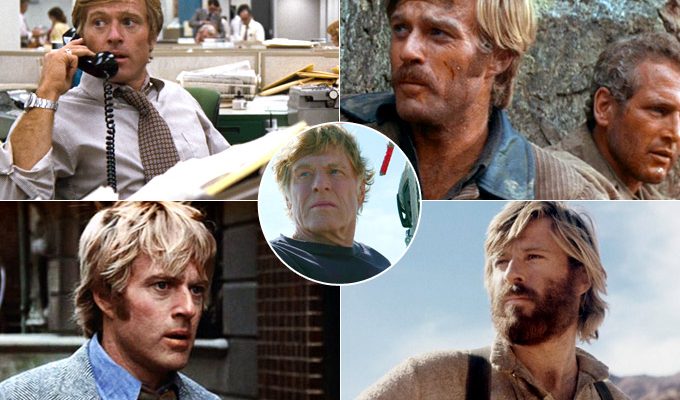 “All the President’s Men” (1976)
“All the President’s Men” (1976)
Up until “All Is Lost,” the most dynamic performance of Redford’s career was probably as Bob Woodward in Alan J. Pakula‘s “All the President’s Men,” alongside Dustin Hoffman as Carl Bernstein. Supposedly Redford and his costar Hoffman did a whole bunch of research in advance of their performances, visiting the Washington Post offices for months and conducting endless interviews with actual reporters. (When the filmmakers wanted to film there, they were denied, and so the office was recreated at what was then a stagger $200,000.) The movie is meticulously detailed, from William Goldman‘s crackling script to Pakula’s direction, particularly those long shots like the one in the Library of Congress where you just don’t think it’s ever going to end. Oftentimes Redford seems to be a part of a project not particularly because it’s the showiest role for him but because he knows how good the final product is going to be, and he just wants to be a part of that. It was Redford who first optioned the book by Woodward and Bernstein and saw it through what can charitably be described as a “hellish” development process. Redford has always been amazing at conveying his thoughts, and audiences have delighted in watching him put together puzzles for his entire career, so getting to see him uncover the Watergate scandal is positively thrilling. There’s a reason that “All the President’s Men” has been a model for similar procedurals in the years since (most notably “Zodiac” and “Zero Dark Thirty“). Redford’s performance should also be a model for anyone in one of these movies. It’s that damn good.
 “The Natural” (1984)
“The Natural” (1984)
One of the most iconic moments in Redford’s career (one that is, it goes without saying, littered with iconic moments), is when, at the end of “The Natural,” his washed up (and injured) baseball player hits a pennant-winning home run, sending the ball soaring into the overhead lights, a shower of sparks raining down upon him as he circles the bases. Now that is a moment. The rest of Barry Levinson‘s sprawling baseball drama (based on a 1952 novel by Bernard Malamud) is pretty wonderful too, from its epic scope that sees Redford playing a younger version of his character— who is taken advantage of and left for dead—to his resigned performance as an older, beat up player that nobody wants anymore. The script by Robert Towne offered Redford the chance to play a whole host of emotions and do interesting things with his physicality in a story that stretches decades. In Roy Hobbs, Redford created an indelible character, to the point that they still sell New York Knights caps (after the fictional baseball team in the movie) at J. Crew stores nationwide. While the movie is widely cited as one of the greatest sports movies ever made, too little attention is paid to the nuance and subtlety of Redford’s performance. Without it, the movie would fall apart, and probably become awash in stereotypical sports movies clichés. With his performance, it’s anchored, grounded, and even with its numerous flights of fancy, feels infinitely more real.
 “Sneakers” (1992)
“Sneakers” (1992)
Robert Redford’s self-awareness, delivered with a wink and an upturned grin, has always been one of his most powerful tools. In Phil Alden Robinson‘s deeply entertaining “Sneakers,” Redford was, for the first time, able to mine that self-awareness to allow audiences in on the joke that the once-youthful (to the point of almost agelessness) actor was indeed getting old and cranky (he was 56 when the movie was released). The movie also wittily played with the actor’s history of political activism, as Redford plays Martin Bishop, who we would now describe as a computer hacker, who used to use his genius for political disruptiveness but now acts as a low-rent thief, hired by banks and corporations to test the stability of their security systems. Idealism has been replaced by capitalism, a struggle that seems to wage inside Redford on an endless loop. Redford heads one of the most impressive casts of his career (including Ben Kingsley, River Phoenix, Sidney Poitier, Dan Aykroyd, David Strathairn, Mary McDonnell, James Earl Jones and Timothy Busfield) in a twisty, enormously gripping tale of suspense and the fragility of male egos, directed with aplomb by Robinson and featuring a jazzily atmospheric score by James Horner. The fact that the movie didn’t make any money and remains something of a cultish oddity in the star’s career only deepens its inherent wonderfulness. As Martin Bishop, Redford is a man who is confronted with the ghosts of his past and must reconcile who he was and who he has become; he’s just as charming as ever, but with his advanced age he was able to have that charm punctuated with bittersweet regret. The results are staggering.

